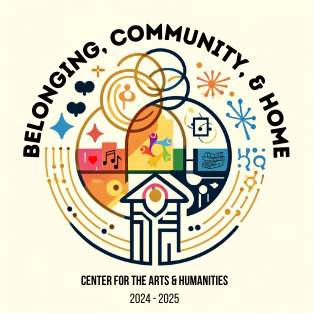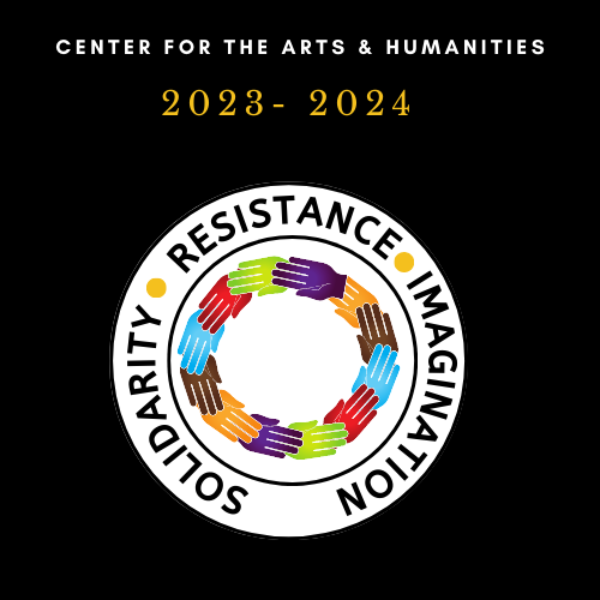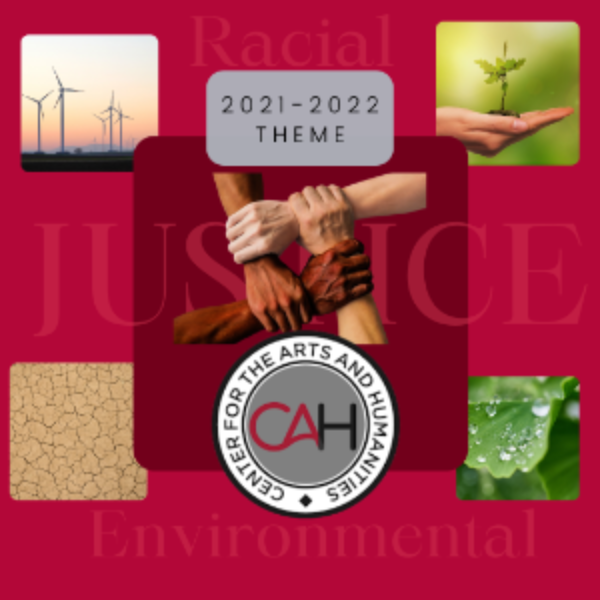
Belonging, Community, and Home, 2024-25
This year, Santa Clara University's Center for the Arts and Humanities invites exploration into the themes of Belonging, Community, and Home. We are prompted to question and understand the essence of meaningful belonging and the construction of community: What does it mean to foster a sense of meaningful belonging and community? What strategies do individuals or groups use to navigate belonging or not belonging, and how might this be connected to The Common Good? How do fictive kinships and chosen families defy oppression, marginalization, and dehumanization? How do communities foster exclusion even as they foster inclusion? How is belonging connected to power and structural systems of domination and oppression? How can the arts and humanities create intentional spaces for belonging and community to encourage feelings of home, or of a home away from home?
At the heart of our inquiry is how the arts and humanities can craft intentional spaces for belonging and community to encourage feelings of home or a home away from home. Through these questions, we seek to inspire proposals and collaborations that bring fresh insights into these critical aspects of human experience, fostering a more inclusive, empathetic, and connected world.
We welcome the engagement of artists, scholars, and the broader community in this reflective journey, inviting contributions that offer new perspectives, solutions, and understandings that bridge divides and bring us closer to a collective sense of home.

Solidarity, Resistance, Imagination, 2023-24
Our theme for 2023-24 focuses on expressions and examinations of solidarity and resistance in the arts and humanities. What does community and selfhood–in the past, present, and future–look and feel like under conditions of radical solidarity? When, where, and how have solidarities taken shape in the name of resistance to unjust legacies of the past, and in pursuit of shared visions for a better future?
Artists working in every form of media, and scholars among all humanistic disciplines, have long pursued and studied solidarity and resistance in such forms as mutual aid, transformational justice, future-oriented utopia, movement building, empathy and action, fellowship, peace and equality, labor unions, humanitarianism.
Resistance, historically and in more contemporary times, often involves solidarity, working together across communities to challenge structures of domination and create positive social change. When we act in solidarity, we join with others in common cause, crossing and challenging the lines and categories used to divide or separate us. Solidarity forges connections and coalitions, celebrates unity and togetherness, helps us imagine more just futures, and encourages the kind of hope and possibility that comes from having each others’ backs.
We welcome proposals and collaborations that develop this theme through programming for 2023-24.

Memory and Movement/s, 2022-23
Memory moves: it travels across time and space, through generations, across borders, and between communities. And it has the emotional power to move us, to change the way we understand the past, experience the present, and imagine the future.
When and where has memory moved in ways that shape us as individual and collective selves? What cultural, political, and aesthetic legacies of memory most animate us today? How does the relationship between remembering or forgetting and dominant public memory foster counter-narratives? How does memory enable movement-building–through art, activism, and the humanities? As we enter a third year of a global pandemic, in a world riven by the persistence of racial injustice, the threat of authoritarianism, and the violence of war, how can memory inspire resistance and move us toward peace and justice?
For 2022-23, we welcome proposals and collaborations to develop arts and humanities programming that engages with and builds on this theme.

Racial and Environmental Justice, 2021-22
This year’s theme builds on our 20-21 theme (Twin Pandemics: COVID and Racial Injustice) by focusing on the further intersections between racial and environmental justice.
How and where do histories of racial inequality and ecological impact intersect? How can we center racial justice in our conversations and actions around climate change, sustainability, and environmental humanities? How can we bring environmental issues to bear on our conversations and actions around incarceration, education, and the arts? How can dismantling structural racism impact the local and global environments in which we live, work, and hope to thrive?
We are open to proposals from campus and community individuals and groups for arts and humanities programming ideas (invited speakers, roundtables, exhibits, actions, collaborations) that engage with these questions.
Our 2020-2021 Theme is: Twin Pandemics
This theme has opened up the conversation on racism, privilege, and COVID-19, and the intersections that exist between them. To keep the conversation active and flowing, the Center has held multiple talks, protests, more throughout the 2020 school year. The first large event of 2021, the Twin Pandemic Forum, took place in October and contained performances, keynote speakers, and many contributions, all recorded and available to access.
Our ongoing blog has been committed to exploring this theme as well since its inception at the start of the pandemic and over 30 articles, poems, and other works have been contributed.
Recordings of the Twin Pandemics Forum are now available: